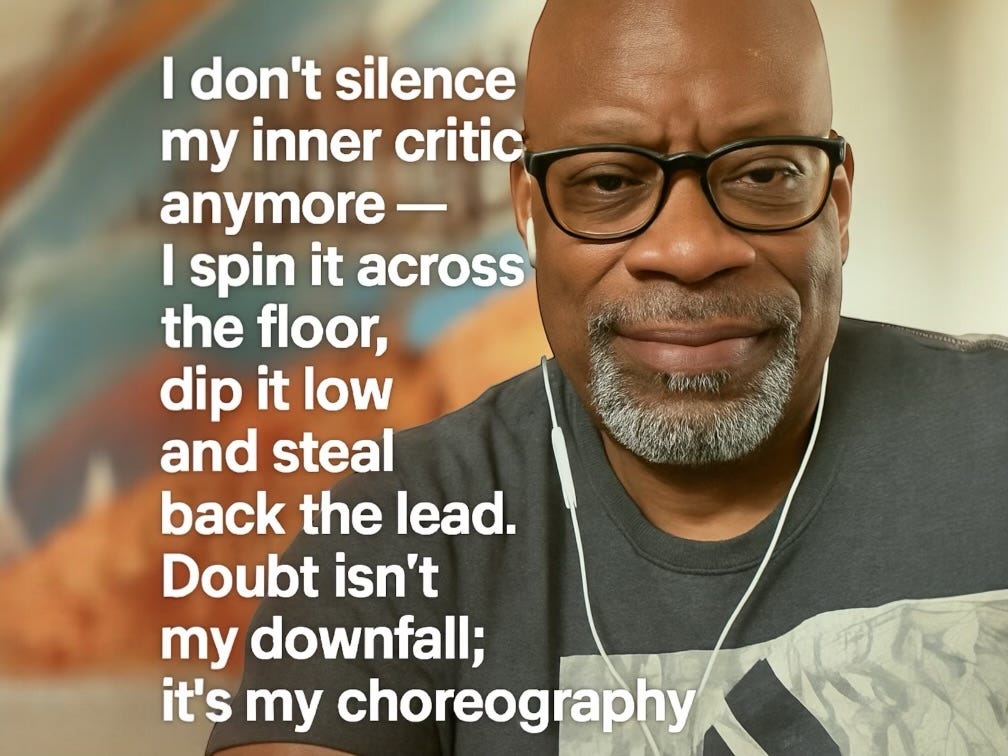There’s a familiar rhythm I know all too well, the one where my inner critic cuts in before I even hear the music.
One moment I’m moving confidently through life, the next I feel a cold hand tugging at my sleeve, whispering, “You sure you’re good enough for this?”
For a long time, I fought it. I thought the goal was to silence that voice entirely. But lately, I’ve realized something much more nuanced, namely, that it’s not about erasing the critic but learning to dance with it. To let it spin me around the floor without letting it lead me off the edge.
Stoic philosophy taught me this first. Marcus Aurelius wrote in Meditations that “the impediment to action advances action.” What stands in the way becomes the way.
My critic, the very voice that once paralyzed me can sharpen me. It invites me to pause, reassess, and strengthen myself. The trick is remembering that I am the dancer, not the dance. I can listen to the music of doubt without letting it choreograph my life.
The Bhagavad Gita offers a similar kind of wisdom. I think of Arjuna standing paralyzed on the battlefield, overwhelmed by fear and confusion. Krishna doesn’t tell him to numb his feelings or pretend he’s fearless. He tells him to act anyway — with detachment from success or failure.
In my own way, I face little battlefields daily: a tough conversation, a big creative project, a public risk. And my inner critic shows up every time, ready to spin. The Gita reminds me that my duty is not to silence doubt but to move forward, focused on the right action, not the guaranteed result.
Still, I’ll admit that my critic sometimes sounds suspiciously like other people. A cutting comment from an interlocutor, a raised eyebrow from a skeptic, an outright dismissal from someone I admire — those things sting.
It’s tempting to brush them off, to say, “They don’t know me.” But if I’m being honest, sometimes they do. Sometimes the cynics, the challengers, the contrarians are giving me something precious: a reflection I wouldn’t have seen on my own.
The Stoics believed in taking all feedback seriously, but not personally. Epictetus said, “If someone criticizes you and it’s true, correct yourself. If it’s false, laugh at it.”
Not everything thrown at me deserves to be woven into my story, but some of it does. Some critiques — even from those who don’t like me — contain hard-earned truth. Learning when to listen, when to thank the critic silently, and when to gently set their judgment aside has been a hard-earned wisdom of its own.
When I treat my inner critic — and my outer critics — as part of the dance rather than the enemy, everything loosens. I can step more freely into creative work. I can risk more in relationships. I can laugh more at my inevitable stumbles. Because, after all, this isn’t a performance for anyone else. It’s a dance of my own becoming.
And the inner critic? They’re just one more partner on the floor, teaching me new moves.
If the Daily Chocolate Taoist nomadic wisdom lights up your day, fuels your mind, or gives you a fresh perspective, I’d love your support as a paid member!
Or, if you’re feeling generous, drop a little (or a lot) of dirty chai latte love my way—every bit helps keep this Taoist journey flowing.
I’m committed to delivering high-quality, thought-provoking features straight to your inbox—no paywalls, no fluff, just raw, unfiltered wisdom on what it means to be human in today’s paradoxical, mysterious, and uncertain world.
Your support fuels my full-time mission, and I appreciate every single contribution. Let’s keep this energy going!
Diamond Michael Scott
aka The Chocolate Taoist





Wisdom comes from everywhere. The most valuable comes from what hurts us. Perhaps because the hurt bores deeply, where we guard most carefully those things that are most vulnerable. Things that are able to stand on their own defend themselves.
😊